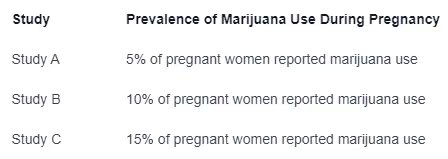Marijuana During Pregnancy - Know the Risks

Understanding Marijuana Use During Pregnancy
Marijuana use during pregnancy is a topic that has gained attention in recent years. It is important to understand the prevalence of marijuana use during pregnancy and the potential risks and concerns associated with it.
Prevalence of Marijuana Use During Pregnancy
The prevalence of marijuana use during pregnancy varies across different populations. According to recent studies, the rates of marijuana use during pregnancy have been increasing. However, it's important to note that prevalence rates can vary based on factors such as geographical location, socioeconomic status, and cultural norms.
To provide a glimpse into the prevalence, here are some statistics from recent studies:

These statistics highlight that a notable number of pregnant women engage in marijuana use, underscoring the need for awareness and education regarding the potential risks and concerns.
Potential Risks and Concerns
While research on the effects of marijuana use during pregnancy is still evolving, there are several potential risks and concerns that have been identified. It is important to note that these risks and concerns can vary depending on factors such as the timing and frequency of marijuana use during pregnancy.
Some potential risks and concerns associated with marijuana use during pregnancy include:
- Impact on Fetal Brain Development: Studies suggest that exposure to marijuana during pregnancy may affect the developing fetal brain. The active compounds in marijuana, such as THC, can cross the placenta and potentially interfere with the normal development of the fetal brain.
- Possible Behavioral and Cognitive Effects: Prenatal marijuana exposure has been associated with potential behavioral and cognitive effects in children. These effects may include problems with attention, memory, and cognitive function.
- Potential Long-Term Consequences: There is some evidence to suggest that prenatal marijuana exposure may have long-term consequences on a child's development and behavior, although more research is needed to fully understand these effects.
It is important for individuals who are pregnant or planning to become pregnant to be aware of these potential risks and concerns.
Understanding the prevalence of marijuana use during pregnancy and the potential risks and concerns is crucial for making informed decisions regarding maternal and fetal health. If you or someone you know is using marijuana during pregnancy and requires support, it is recommended to consult with a healthcare provider for personalized guidance.
Effects on the Developing Fetus
When it comes to marijuana use during pregnancy, it's important to understand the potential effects on the developing fetus. While research in this area is ongoing, studies have highlighted several key areas of concern including the impact on brain development, possible behavioral and cognitive effects, and potential long-term consequences.
Impact on Brain Development
Marijuana use during pregnancy has been associated with potential disruptions in brain development for the fetus. THC, the main psychoactive component of marijuana, can cross the placental barrier and directly affect the developing brain. This can interfere with the formation of neural connections and the proper functioning of brain circuits, potentially leading to long-term consequences for the child.
Possible Behavioral and Cognitive Effects
Studies have suggested that prenatal exposure to marijuana may contribute to behavioral and cognitive effects in children. These effects can manifest in areas such as attention, memory, problem-solving skills, and overall cognitive functioning. However, it is important to note that the exact mechanisms and extent of these effects are still being researched and may vary depending on various factors including the amount and frequency of marijuana use.
Potential Long-Term Consequences
Long-term consequences of prenatal marijuana exposure are still being studied, and more research is needed to fully understand the potential impact. Some studies have suggested that prenatal marijuana exposure may be associated with an increased risk of certain behavioral issues, such as impulsivity, hyperactivity, and difficulties with executive functioning. However, it's important to note that not all individuals exposed to marijuana prenatally will experience these consequences, and other factors can also contribute to these outcomes.
Understanding the potential effects of marijuana use during pregnancy is crucial for expectant mothers and healthcare providers. If you have questions or concerns about the use of marijuana during pregnancy, it is recommended to consult with your healthcare provider for personalized guidance.
The Potential Impact of Marijuana Use on Breastfeeding
While the effects of marijuana use during pregnancy have been widely discussed, less is known about the potential impact of marijuana use on breastfeeding. As THC can be passed through breast milk, it's important for nursing mothers to be aware of the potential risks and concerns associated with using marijuana while breastfeeding.
Research on the topic is still limited, but some studies suggest that exposure to THC through breast milk may affect a child's development and behavior. THC can accumulate in a baby's system and potentially interfere with normal brain development, leading to long-term consequences.
Additionally, marijuana use can also affect a mother's ability to produce breast milk. Some studies suggest that THC may decrease prolactin levels, which are necessary for milk production. This can lead to decreased milk supply and difficulties with breastfeeding.
It's important for nursing mothers who are considering or currently using marijuana to consult with their healthcare provider for personalized guidance. They can offer advice on alternative methods for managing symptoms that do not involve marijuana and provide resources for quitting if necessary.
Overall, more research is needed to fully understand the potential impact of marijuana use on breastfeeding. However, it's important for mothers to take caution and prioritize their child's health when making decisions about substance use while breastfeeding.
Maternal Health Considerations
When it comes to marijuana use during pregnancy, it's crucial to consider the potential risks and impacts on maternal health. Understanding these considerations is essential for making informed decisions and ensuring the well-being of both the mother and the developing baby.
Risks to the Mother
Marijuana use during pregnancy can pose certain risks to the mother's health. While research is still ongoing, some potential risks associated with maternal marijuana use include:
- Increased likelihood of mental health issues, such as anxiety and depression.
- Respiratory problems due to smoking marijuana, which can exacerbate existing conditions like asthma.
- Impaired judgment and coordination, leading to an increased risk of accidents or injuries.
- Potential addiction or substance use disorder, which can have long-term consequences.
It is important for expectant mothers to prioritize their own health and seek support and guidance from healthcare professionals. If you have concerns about marijuana use during pregnancy, consult with your healthcare provider for personalized advice and assistance.
Effects on Pregnancy Outcomes
Pregnancy outcomes can be influenced by marijuana use. Research suggests that maternal marijuana use during pregnancy might lead to various effects on the developing baby, including:
- Lower birth weight: Babies born to mothers who use marijuana during pregnancy may have a lower birth weight compared to babies born to non-users.
- Premature birth: There is some evidence to suggest that maternal marijuana use may increase the risk of preterm labor and premature birth.
- Neonatal intensive care unit (NICU) admissions: Babies exposed to marijuana in utero may have an increased likelihood of requiring care in the NICU.
- Stillbirth: While the evidence is limited, some studies suggest a potential link between maternal marijuana use and an increased risk of stillbirth.
It's important to note that the research on these outcomes is ongoing, and individual experiences may vary.
Interaction with Other Substances
The interaction between marijuana and other substances is another important consideration for maternal health during pregnancy. Using marijuana alongside other substances, such as tobacco or alcohol, can compound the risks and potentially have more detrimental effects on both the mother and the developing baby.
Combining marijuana with substances like tobacco can increase the risk of adverse pregnancy outcomes, such as low birth weight and preterm birth. It's crucial to be aware of the potential interactions and consult with healthcare professionals for personalized advice.
If you have concerns about marijuana use during pregnancy and its potential effects on maternal health, discussing these concerns with your healthcare provider is of utmost importance. They can provide guidance, support, and resources to address your specific needs. Additionally, seeking out resources for support and education can offer valuable information and assistance.
Seeking Help and Support
If you or someone you know is struggling with marijuana use during pregnancy, it's important to seek help and support. Addressing the issue and reaching out for assistance can have a significant impact on both the mother's well-being and the health of the developing fetus. Here are some steps you can take to seek the support you need.
Talking to Your Healthcare Provider
One of the first steps in seeking help is to have an open and honest conversation with your healthcare provider. They are equipped to provide guidance, support, and resources tailored to your specific situation. Your healthcare provider can discuss the potential risks associated with marijuana use during pregnancy and provide information on available treatment options. They can also address any concerns you may have and guide you towards making informed decisions. Remember, your healthcare provider is there to support you and ensure the best outcome for both you and your baby.
Resources for Support and Education
There are various resources available that can provide additional support and education regarding marijuana use during pregnancy. These resources can offer information on the potential risks, provide guidance on seeking help, and connect you with support groups or counseling services. Educating yourself about the topic can empower you to make informed choices and seek the necessary support.
Treatment Options for Substance Use Disorders
For individuals struggling with substance use disorders, including marijuana use during pregnancy, various treatment options are available. It's important to remember that seeking treatment is a courageous step towards improving your own well-being and the health of your baby. Treatment options may include counseling, behavioral therapies, and support groups. These interventions can provide the necessary tools to address the underlying issues contributing to substance use and develop healthier coping mechanisms. Your healthcare provider or local treatment centers can provide information on the available options and help you find a treatment plan that suits your needs.
Remember, seeking help and support is essential for both you and your baby's well-being. By reaching out to healthcare professionals, utilizing educational resources, and exploring treatment options, you can take proactive steps towards a healthier future.
Conclusion
In conclusion, while research on the effects of marijuana use during pregnancy is still developing, it's important to understand the potential risks and concerns associated with it. The prevalence of marijuana use during pregnancy has been increasing in recent years, underscoring the need for awareness and education.
Expectant mothers should prioritize their own health and seek support from healthcare professionals to make informed decisions for themselves and their developing babies. Understanding the potential effects on maternal health, fetal brain development, possible behavioral and cognitive effects, and long-term consequences can help individuals make informed choices.
If you or someone you know is struggling with marijuana use during pregnancy, seeking help and support is crucial. Talking to your healthcare provider, utilizing educational resources, and exploring treatment options are all proactive steps towards a healthier future for both mother and baby. By taking these steps, individuals can address underlying issues contributing to substance use and develop healthier coping mechanisms for a brighter future.
Sources:
- https://www.cdc.gov/marijuana/health-effects/pregnancy.html
- https://www.ncbi.nlm.nih.gov/pmc/articles/PMC7021337/
- https://www.samhsa.gov/marijuana/marijuana-pregnancy#:~:text=Marijuana%20use%20during%20pregnancy%20can,and%20growth%20and%20development%20issues.
- https://www.acog.org/clinical/clinical-guidance/committee-opinion/articles/2017/10/marijuana-use-during-pregnancy-and-lactation
